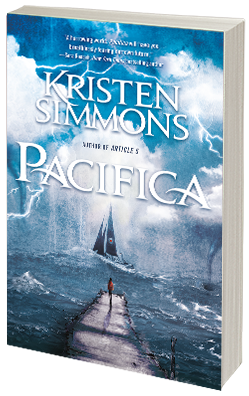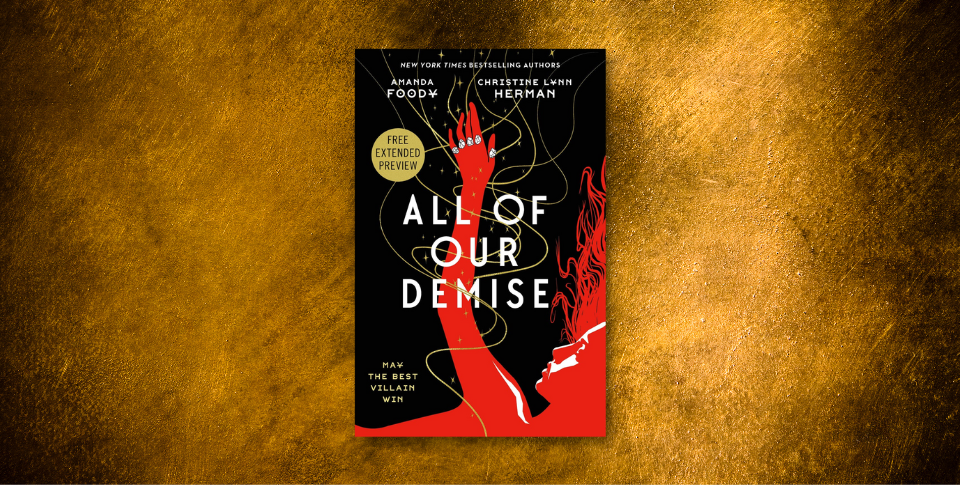
Blue skies. Green grass. Clear ocean water. An island paradise like the ones that existed before the Melt.
A lucky five hundred lottery winners will be the first to go, the first to leave their polluted, dilapidated homes behind and start a new life. It sounds perfect. Like a dream.
The only problem? Marin Carey spent her childhood on those seas and knows there’s no island paradise out there. She’s corsario royalty, a pirate like her father and his father before him, and she knows a con when she sees one. So where are the First Five Hundred really going?
The paperback of Pacifica is now on sale. Enjoy this excerpt!
Chapter 1
 [dropcap type=”circle”]W[/dropcap]hen Marin was twelve years old, her father told her two things. The first was that there were two kinds of people in this world: ones that stabbed you in the chest, and ones that stabbed you in the back. She’d thought this was some kind of riddle, and asked about the ones who stabbed you in the side, or even the leg. Surely there was a third category for people who aimed for your foot.
[dropcap type=”circle”]W[/dropcap]hen Marin was twelve years old, her father told her two things. The first was that there were two kinds of people in this world: ones that stabbed you in the chest, and ones that stabbed you in the back. She’d thought this was some kind of riddle, and asked about the ones who stabbed you in the side, or even the leg. Surely there was a third category for people who aimed for your foot.
He’d laughed, a deep, proud sound she’d remember until the day she died, and told her the second thing that there was no way around it. His little girl was a corsario. A pirate. Just like him.
She’d seen the truth in his blue eyes. Seen the open seas and the skies, built from the stories he’d whispered as she fell asleep at night. It was what she’d wanted all her life to sail the ocean chasing adventure, a feather in his wing and in that moment, her wish had been granted.
Then he’d placed a knife in her hand, a hooked silver blade with a gritty bone handle, turned, and pushed three men, bound and gagged, over the side of a boat.
Chapter 2
“Mr. Torres, how good to see you.”
Ross returned a warm smile to the secretary of trade, a recent addition to his father’s cabinet following the disastrous demise of the last one. Ross couldn’t remember the details, but there was something about an only partially accounted for rail shipment from one of the farming districts and a mistress from some companionship service in Lower Noram. His mother had hugged the man’s wife and told her it would blow over soon, and then spent the next four days on the comm telling anyone who would listen about the “scandal of the century.”
“Likewise,” said Ross. “I hope your family’s settling into your new home.”
“They are, thank you.” The man ran a hand over his smooth, almost shiny jaw, clearly contemplating his next words. People often thought they needed to watch what they said in front of Ross. The truth was it didn’t matter. His father didn’t listen to him anyway.
“So,” said the secretary. “Only six days left until relocation. You must be so proud of your father’s hard work.”
His father’s Relocation Act a five-years-in-the-making opportunity, as his dad called it, for five hundred Noram citizens to start fresh on a man-made island, built in secret near the Alliance seaboard was the point of tonight’s gathering. The lottery for who would be chosen to go in the first wave was to take place within the hour.
“Absolutely,” said Ross. He was used to this kind of small talk. Since his father had started in politics when Ross was five, he’d been coached on the right things to say. The Moderate Party lines his father touted Alliance citizens work hard to stand strong, and support self-sufficiency, individually and worldwide were all part of his vocabulary, though he maintained only a surface knowledge of their meaning.
His eyes roamed around the room. At ten stories, the Natural History Museum was one of the tallest buildings east of the jagged cliff that split the Alliance’s capital city, Noram. It was a lightning rod for the superstorms that invaded the area for weeks at a time, a natural power generator whose electric ran on the energy it gathered from the clouds. The very idea of standing within it gave Ross the creeps.
He didn’t like storms. Never had.
“It’s unusual to find a leader so invested in the welfare of his people,” said the secretary.
Ross thought he caught a hint of sarcasm in the man’s voice, but it was hidden by a smile. Before he was forced to think of a shallow-but-clever answer, the lights dimmed. On the opposite side of the room, in front of a glass staircase leading to the second level, a screen lowered, drawing the attention of half the room.
“Ah, here it is now,” said the secretary, grabbing a flute of champagne from a server passing by.
A woman’s voice came through the speakers. “For too long our people have suffered, plagued by overcrowding, disease, and lack of work.”
A view of the old hospital, recently converted to a relocation center, filled the screen. Men and women stood in a line that rounded the block, carrying application packets for the clerks sitting behind tables. It was a staged image, of course. The relocation center was the meeting point for those who objected to relocation, and rioted nightly in Lower Noram. This picture only really worked if the people in line were holding baseball bats and screaming at the police.
“We have only just survived for too long. Now we must take the next step and thrive.”
The final image of the ad was of the island, oval in shape, blanketed by green, surrounded by blue. Not like Noram, where, unless it was storming, the skies were perpetually beige and hazy. The camera focused on a house with a cozy living area, already decorated with a two-seater couch and a painting hanging on the wall.
He didn’t see what people were complaining about. Last he checked, a place like this was a step up from most of the slums below the cliffline.
“Pacifica,” said the woman’s voice. “A new beginning.” A quick male voice followed up with, “Paid for by the Relocation Act. Relocation: a new beginning.”
The lights came back on as a woman took the podium beside the screen, offering a welcome only acknowledged by half the people in the room.
“Excuse me,” said Ross, waving at some invisible person in the corner before the secretary could ask him anything else. “It was good seeing you, sir.”
Dressed in a new suit made of cool, synthetic material, he fitted his broad shoulders through the small groupings of men and women in formal attire, making his way toward the glass staircase in the center of the room. There, the buffet was fully stocked with bite-sized hors d’oeuvres, but he wasn’t hungry. He’d been to three events this week alone to celebrate his father’s Relocation Act. They were all starting to blend together.
There was a sameness here, as if everyone had been created by an identical mold. Men in black suits joking about politics, women in shiny dresses with too much makeup. Everyone made the same dull small talk and pried for the same gossip. It never changed.
“Try to contain your enthusiasm,” came a wry voice from beside him. “You’re starting to freak people out.” Ross turned to see Adam Baker, the vice president’s son, reaching for a tomapple a hearty apple-tomato hybrid, the newest creation from Noram’s farming labs according to the overenthusiastic girl doing the serving.
Ross’s mood lifted. He painted an almost painfully wide smile on his face. “Mr. Baker! Delightful to see you. Positively stellar suit, young man. What is it? Recycled plastic?” He brushed the nonexistent dust off of Adam’s shoulder, noticing the red flower above his chest pocket. Most people here tonight were wearing them they must have been significant to the Relocation Act somehow.
“Pancake, actually,” said Adam, bringing out the bass in his voice. “It’s a bit crumbly, but completely biodegradable. And if you get hungry, you can just take a bite right off the arm.”
Ross laughed overenthusiastically, then tilted his head forward. “If we don’t get out of here soon I’m going to bite off my own arm. I will literally chew it off.”
The gleam faded from Adam’s eyes. He turned his gaze to the plate of food, small samples balanced carefully one atop another. “Come on. It’s not so bad.”
Ross picked up a tomapple, eyeing it suspiciously. Next to Adam, he was tall, almost a head taller, and broader through the shoulders. Despite his family’s Latino ancestry, his skin was paler than Adam’s had ever been, like the others above the cliff who spent most of their time sheltered from the sun’s harmful, cloud-piercing rays. He was built like his father: slim, but with enough presence to demand attention. His eyes were cobalt blue, his hair dark brown and forever sticking out sideways like he’d just rolled out of bed. It was a combination that made him adorable to grandmothers, inappropriately intriguing to his mom’s friends, and irresistible to the girls at Center Academy.
“You don’t ever get tired of it?” he asked.
“Of what?”
“This,” said Ross, motioning to the room. “All of it. The benefits, and the campaigning, and the stupid school assignments.” He took a bite of the tomapple and cringed at the mushy texture. After forcing himself to swallow, he balanced the rest of the fruit on Adam’s full plate. “It’s exhausting. Can’t we just do something not boring for once?”
“I guess,” said Adam, in a way that seemed to mean, you’re an asshole.
Ross turned slowly, surveying the room again, noting the security guards who stood like statues by the exits and windows, and Adam’s parents, polished, but still noticeably different with their less formal attire and their tan skin. They seemed to be the only political pair not swamped by a circle of donors dying to have their voice heard, which could have had something to do with Adam’s father’s set scowl, and the way his mother kept shaking her head disapprovingly.
“At least your parents are having a good time,” Ross said.
“Oh, they’re thrilled,” Adam grumbled.
Adam’s dad was staunchly opposed to the Relocation Act and had been from its inception, five years prior. It was part of his Progressive Party mentality, according to Ross’s father. Noah Baker thought it was unethical to uproot people from their homes when those people were poor and hungry the desperate didn’t make sound decisions. Ross supposed if the Shorelings, as they were sometimes called because of their proximity to the water, just got jobs like his dad sometimes let slip, they wouldn’t be so desperate.
Noah supported what he called Revitalization, not relocation rebuilding the docks rather than sending away the occupants. It’s what the protesters, who claimed relocation was just a way for the government to kick out the poor, yelled and screamed about each night at the old hospital below the cliffline. It was a huge point of contention between their fathers.
Adam, having finished his tomapple, picked up Ross’s and took a bite. “This morning Dad said there were riots as far up as the Oregon Coast last night. They had to call in the Armament.”
“Nobody that far north can even apply to go to Pacifica,” said Ross.
Adam scoffed. “That doesn’t mean they don’t think it’s wrong. People all over are protesting. Launch is only six days away. It’s only going to get worse until then.”
Ross hoped so. Maybe the Shorelings would light something else on fire tonight. That would be neat.
“We should go see it,” he said.
“See what?”
“The riots,” said Ross. Before the words were even out the idea had taken hold, rooting itself in his brain. He’d seen the people gathering at the old hospital on the news. The fights and fires. The chants they yelled at the cliff, hoping someone his father maybe would hear.
It would be a hell of a lot more exciting than this.
“No,” said Adam, seeing the change on Ross’s face. “No. Forget it. We’d be crazy to go down there. The place is practically a war zone. Especially after dark.”
“Well, that’s very dramatic,” said Ross. He rubbed his hands together, seeing his wild eyes reflected in Adam’s wary gaze. “You know the broadcasts make it seem worse than it is. That’s how they get people watching.” He ignored Adam, who was now shaking his head vehemently. “We’ll keep a healthy distance from anything even remotely dangerous. I would go alone, but I’ve never been to the docks before. If I got lost . . . who knows what might happen to me.”
“I know,” said Adam. “I know exactly what might happen to you.”
Ross slung an arm over his friend’s narrow shoulders, causing his friend to almost lose his hold on the plate. “You know you want to see it.”
Adam didn’t look up at him as he shrugged out of his embrace. After a moment, he swore again.
Ross slapped him on the back. “That’s the spirit.”
He was caught in the gaze of a woman with silvery-white hair, cut in a straight line across her forehead. Her dress was black, conservative, and adorned with a semi-ridiculous bow on her right shoulder. At the sight of her, Ross felt a familiar mixture of warmth and dread.
She motioned him over.
“Coat closet, twenty minutes,” said Ross quietly. “It has a street exit.”
Adam nodded gravely and stuffed another appetizer in his mouth.
Copyright © 2018 Kristen Simmons



